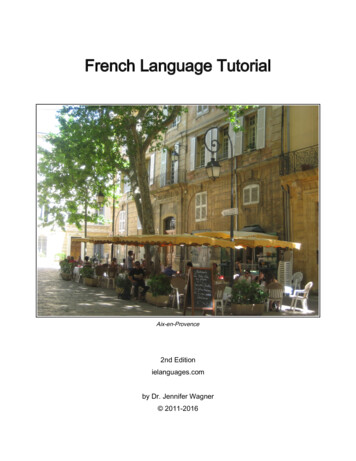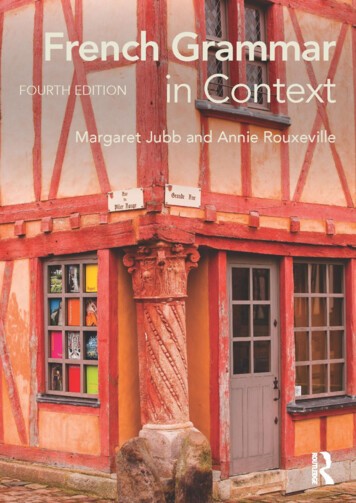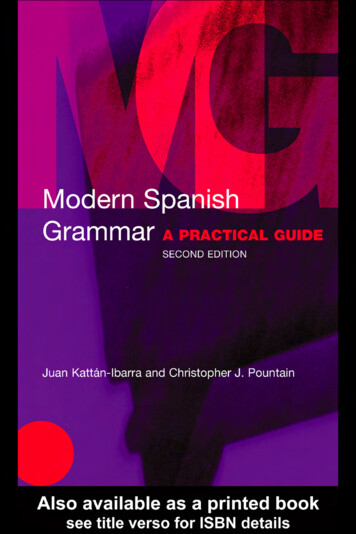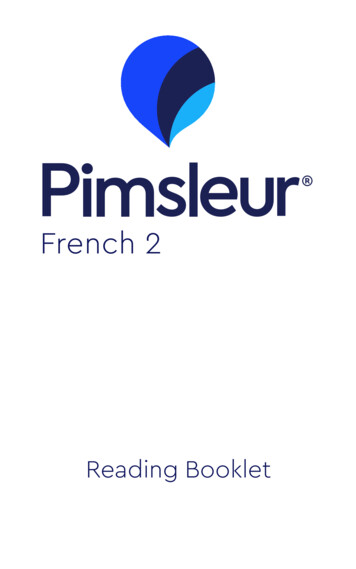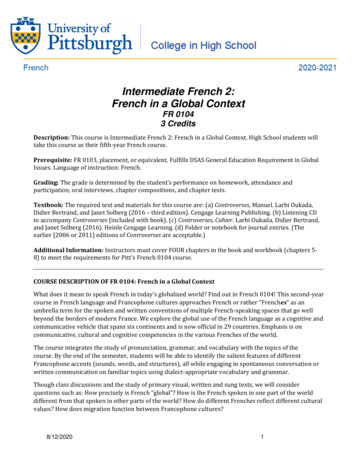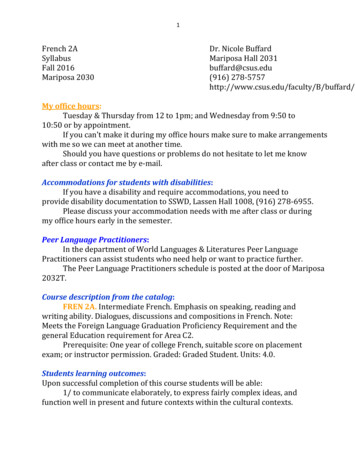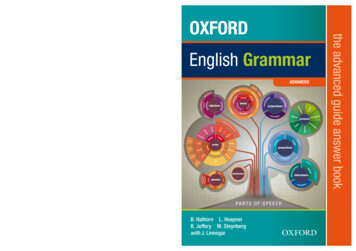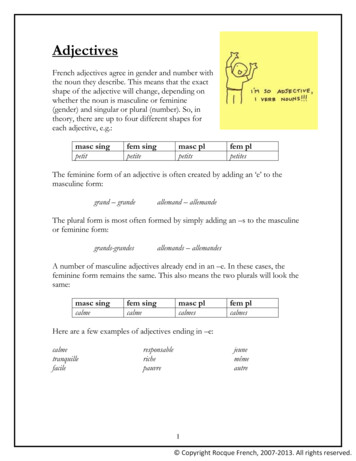
Transcription
AdjectivesFrench adjectives agree in gender and number withthe noun they describe. This means that the exactshape of the adjective will change, depending onwhether the noun is masculine or feminine(gender) and singular or plural (number). So, intheory, there are up to four different shapes foreach adjective, e.g.:masc singpetitfem singpetitemasc plpetitsfem plpetitesThe feminine form of an adjective is often created by adding an ‘e’ to themasculine form:grand – grandeallemand – allemandeThe plural form is most often formed by simply adding an –s to the masculineor feminine form:grands-grandesallemands – allemandesA number of masculine adjectives already end in an –e. In these cases, thefeminine form remains the same. This also means the two plurals will look thesame:masc singcalmefem singcalmemasc plcalmesfem plcalmesHere are a few examples of adjectives ending in unemêmeautre1 Copyright Rocque French, 2007-2013. All rights reserved.
Fill in the feminine forms of the following adjectives using the rules above:1. Il est fatigué. Elle est 2. Le pull est gris. La robe est 3. Ce camion est japonais. Cette voiture est 4. Ce roman est mauvais. Cette nouvelle est .5. C’est un film français. C’est une émission There are a few other regular patterns of change between masculine andfeminine adjectives:bon – bonneancien - anciennegentil – gentillemasc singgentilaffreux – affreuseheureux - heureusesportif – sportivefem singgentillemasc plgentilsneuf - neuvecher – chèredernier - dernièrefem plgentillesSome adjectives are simply irregular, and need to be learnt by heart. Below aresome key examples:blanc – blanchefaux – faussefou – follefrais – fraîchelong – longuepublic - publiquesec - sècheroux - rousseImportantly, there is a third variant to learn for a few in this category: the formthey take when they precede a masculine singular noun that starts with a vowel.These are more closely linked to the feminine form, and it may be easier toremember them in this way:2 Copyright Rocque French, 2007-2013. All rights reserved.
Masc singfouvieuxnouveaubeauMasc singbefore belleExamples:Son nouvel emploi est ennuyeux – her new job is boringCe bel homme est son cousin – this handsome man is her cousinCe vieil edifice appartenait à un prince – this old building belonged to a prince.Your turn! Fill out the feminine singular, masculine plural and feminine pluralforms of the following adjectives. If you are unsure of the feminine form, use adictionary to check the pattern – the feminine form is listed after themasculine entry. For instance: italien, -enne, allemand, -eFor the irregular adjectives, the masculine plural is formed by adding ‘s’ to themasculine singular. You need to look up the feminine singular form (givenabove) and add an ‘s’ to this for the feminine plural. Make sure you know whatall of the words mean and note this.masc singIl est em singElle est .masc plIls sont fem plElles sont 3 Copyright Rocque French, 2007-2013. All rights reserved.
PositionIn English, adjectives tend to go before the noun they describe (my new house,my old grandmother etc).In French, they almost all go after the noun (les plats italiens, les chaussures noires, lalangue française).There is a small group of adjectives, however, that normally precede the noun.These adjectives may be categorized as adjectives of Beauty, Age, NumbersGoodness, and Size (BANGS) (!)Beautyjoli (jolie),prettybeau (belle),beautifulAgejeune, de), tall,bigdeuxième,secondbon (bonne),goodpetit (petite),littlevieux (vieille),oldtroisième,thirddernier(dernière), lastgros (grosse),big, fatlong (longue),longcourt (courte),shortun petit garçon – a little boyun vieil arbre – an old treeun nouveau gazon – a new lawnun beau jour d’été – a beautiful summer day4 Copyright Rocque French, 2007-2013. All rights reserved.
Insert the correct form of the given adjectives into the correct place in thesesentences. The noun is given in italics:1. J’ai fait un voyage (long) .2. C’est la fois que je t’écris (dernier) 3. Amanda est une fille (joli) .4. C’est une faute (petit) .Finally Some adjectives can be used either before or after the noun – however theirmeaning varies according to their position:un ancien élève – a former studentun cher ami – a dear friendma propre voiture – my own carune ville ancienne – an ancient cityun bijou cher – an expensive jewelma voiture propre – my clean carTranslate the following:1. A former colleague (le collègue) 2. My dear wife .3. A clean house .5 Copyright Rocque French, 2007-2013. All rights reserved.
In English, adjectives tend to go before the noun they describe (my new house, my old grandmother etc). In French, they almost all go after the noun (les plats italiens, les chaussures
